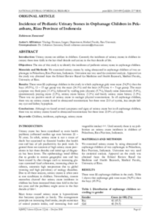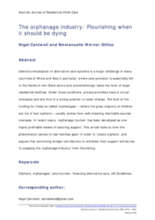Displaying 721 - 730 of 1510
This paper discusses findings from a small-scale qualitative study conducted in Harare, Zimbabwe. Findings show that young people aging out from Harare’s care institutions face challenges making their transition from care into adulthood.
This article reports on a systematic review of research on residential care-leaving in South Africa, from 2003 to 2016.
In this webinar, hosted by Rise Learning Network, Deep Savarni, Founder & Director of Praajak Development Society shares his experience in establishing the Child Protection Committees as a means to realize effective participation of children in monitoring care services in government-run child care institutions in India.
This dissertation was an ethnographic narrative study tracking eight young women who were “aging out” or forced to leave their orphanage in Peru, where most of them had spent a majority of their lives. The study examined the way in which a collaborative art community could support the participants as they narrated their lives over a 16-month period of time through photojournaling and social media outlets.
The aim of this special issue of the International Journal of Longitudinal and Life Course Studies is to examine the outcomes of children who were raised for part of their childhood in out-of-home care, including in foster care and institutions.
This paper from the journal of Social Work/Maatskaplike Werk discusses the experiences of parents receiving family reunification services because their children have been placed in child and youth care centres in South Africa.
The aim of this study is to identify the incidence of pediatric urinary tones in orphanage children in Indonesia.
This article examines the care experiences of former looked‐after children from a residential care setting in South Africa.
This paper offers an overview of residential care for children in Japan and its ongoing development.
This article looks at how the orphanage industry serves to tear families apart in order to ‘create orphans’, and argues that convincing foreign contributors to withdraw their support will be key to stopping the ‘orphanage industry’ from flourishing.



